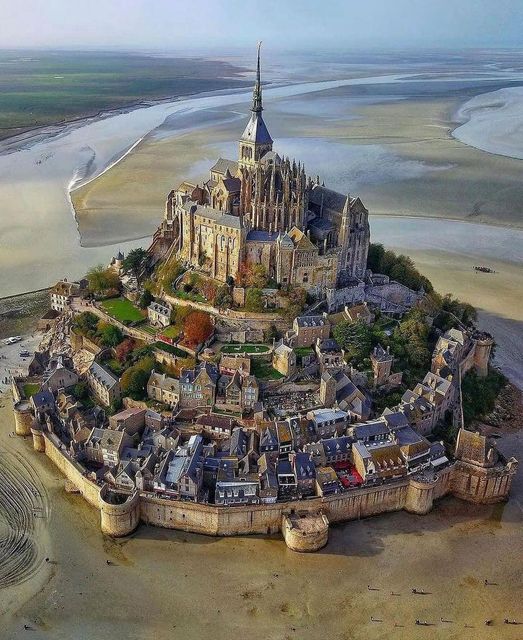Introduction
Nestled off the northern coast of France, along the picturesque English Channel, lies an island that has captivated the hearts and imaginations of millions. This is the remarkable Mont-Saint-Michel – a history-steeped, tidal island that is widely regarded as one of the most beautiful sites in all of Europe.

Despite its tiny year-round population of less than 30 people, Mont-Saint-Michel welcomes an astounding 3 million visitors annually. What draws so many to this remote and seemingly isolated rock? The answer lies in its rich history, stunning natural beauty, and the sheer architectural marvel of the structures that cling to its slopes.
In this comprehensive blog post, we’ll delve into the fascinating story of Mont-Saint-Michel, exploring its origins, evolution, and the many wonders that make it a must-visit destination. From its strategic position and dramatic tidal changes to its iconic abbey and charming medieval streets, prepare to be captivated by this true gem of France’s north coast.
The Origins of Mont-Saint-Michel
The origins of Mont-Saint-Michel can be traced back to the 8th century, when the island was first settled by a monastic community. According to legend, the Archangel Michael himself appeared to the Bishop of Avranches in a vision, instructing him to build a church on the rocky outcrop. This divine inspiration led to the construction of the first religious structures on the site, marking the beginning of Mont-Saint-Michel’s long and storied history.
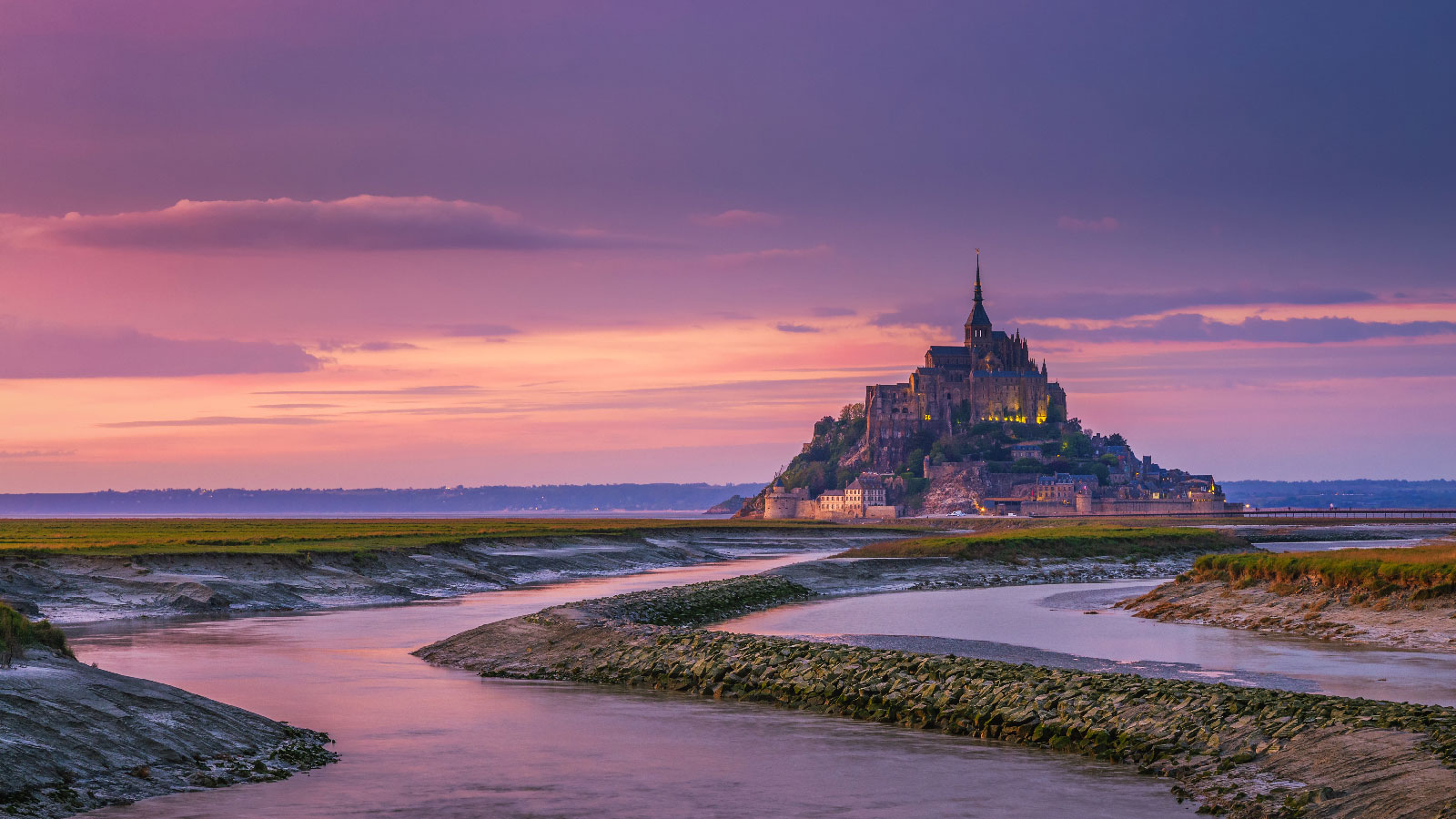
In the centuries that followed, the island’s strategic location, perched on the border between Normandy and Brittany, made it a highly sought-after stronghold. During the Hundred Years’ War between France and England, the island’s fortified abbey and surrounding walls played a crucial role in defending the French coast from English incursions. The Mont’s impregnable position, surrounded by treacherous tidal waters, earned it the nickname “The Wonder of the West” and cemented its reputation as an almost impenetrable fortress.
The Tidal Transformation of Mont-Saint-Michel
One of the most captivating aspects of Mont-Saint-Michel is the way it interacts with the surrounding tides. Situated in the middle of a vast, shallow bay, the island is completely cut off from the mainland during high tide, when the waters rise dramatically to surround it. This tidal phenomenon has been a defining feature of the Mont since its earliest days, shaping both its history and its unique landscape.
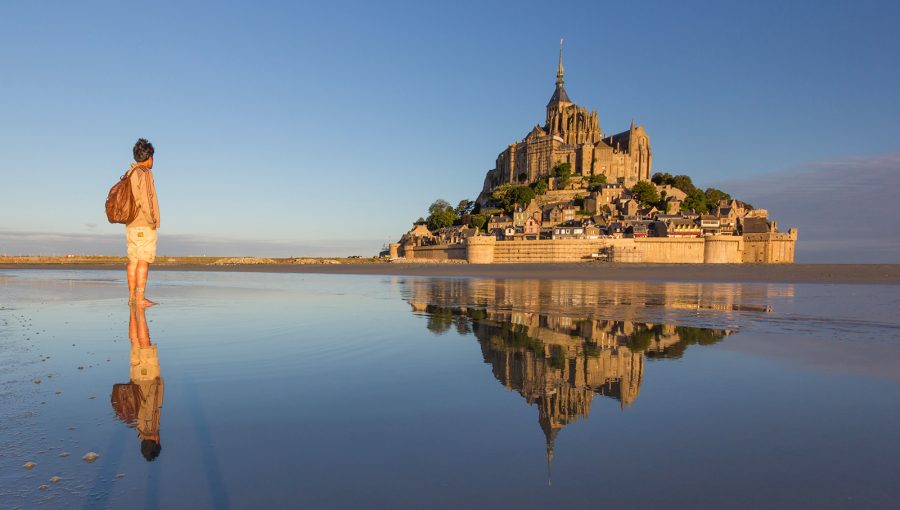
At low tide, the bay’s sands are exposed, allowing visitors to walk across the mudflats and reach the island on foot. However, the tides can rise and fall as much as 46 feet (14 meters) in a single day, transforming the landscape in a matter of hours. During high tide, the island becomes an isolated, otherworldly sight, with the abbey and surrounding buildings seemingly floating atop the glistening waters.
This dramatic ebb and flow of the tides has long been a source of both fascination and challenge for those who have lived on or visited the Mont. In the past, the unpredictable waters posed a significant threat to the island’s residents, who had to time their movements carefully to avoid being stranded or swept away. Today, the tidal changes continue to captivate and delight visitors, who revel in the opportunity to witness this natural spectacle.
The Architectural Wonders of Mont-Saint-Michel
As visitors approach the island, they are immediately struck by the sheer architectural grandeur of Mont-Saint-Michel. Rising majestically from the surrounding waters, the island’s buildings are a harmonious blend of Romanesque and Gothic styles, each structure seemingly stacked upon the next in a harmonious, organic fashion.
At the heart of this architectural ensemble is the iconic Abbey of Mont-Saint-Michel, a towering Benedictine monastery that has been a spiritual and cultural center for centuries. Construction on the abbey began in the 11th century, and over the following centuries, it was expanded and embellished, resulting in a stunning amalgamation of architectural styles.
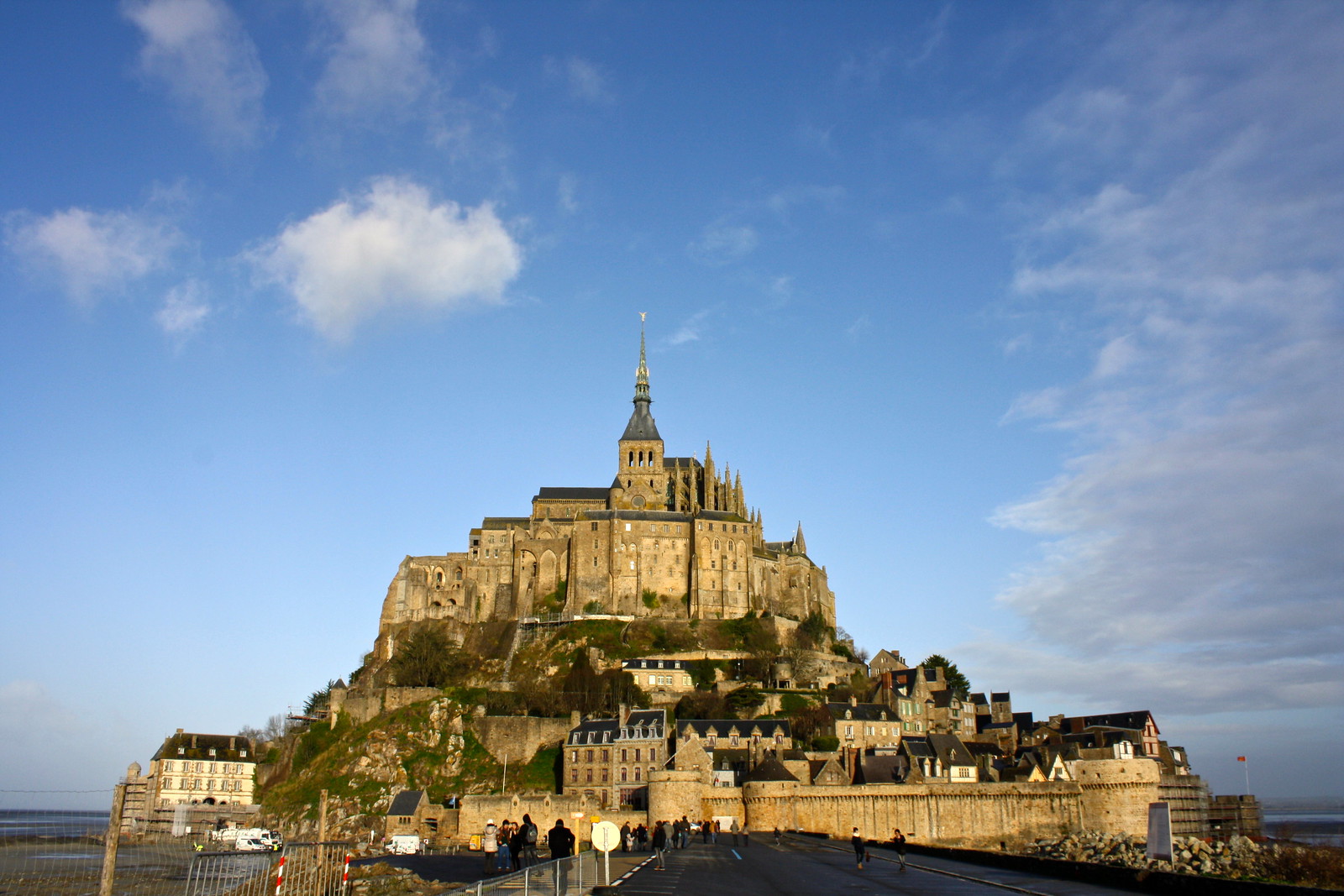
The abbey’s most famous feature is the towering, spire-topped church, which dominates the island’s skyline. Visitors can explore the abbey’s intricate cloisters, refectory, and chapter house, all of which showcase the remarkable craftsmanship and attention to detail that characterized medieval architecture. The abbey’s underground crypts and ramparts also offer fascinating glimpses into the island’s fortified past.
Surrounding the abbey, the island’s winding streets are lined with charming medieval houses, shops, and restaurants, creating a captivating and immersive atmosphere for visitors. This harmonious blend of religious, military, and civilian structures is a testament to the ingenuity and resilience of the people who have called Mont-Saint-Michel home over the centuries.
The Vibrant Cultural Life of Mont-Saint-Michel
Despite its small permanent population, Mont-Saint-Michel is a hub of cultural activity and events throughout the year. The island’s rich history, stunning natural beauty, and unique architectural features have long inspired artists, writers, and musicians, who have sought to capture the essence of this remarkable place.
One of the most well-known cultural events on the island is the annual Feast of St. Michael, which takes place on the 29th of September. This celebration honors the Archangel Michael, the patron saint of the island, and features a procession, concerts, and other festivities that draw visitors from around the world.
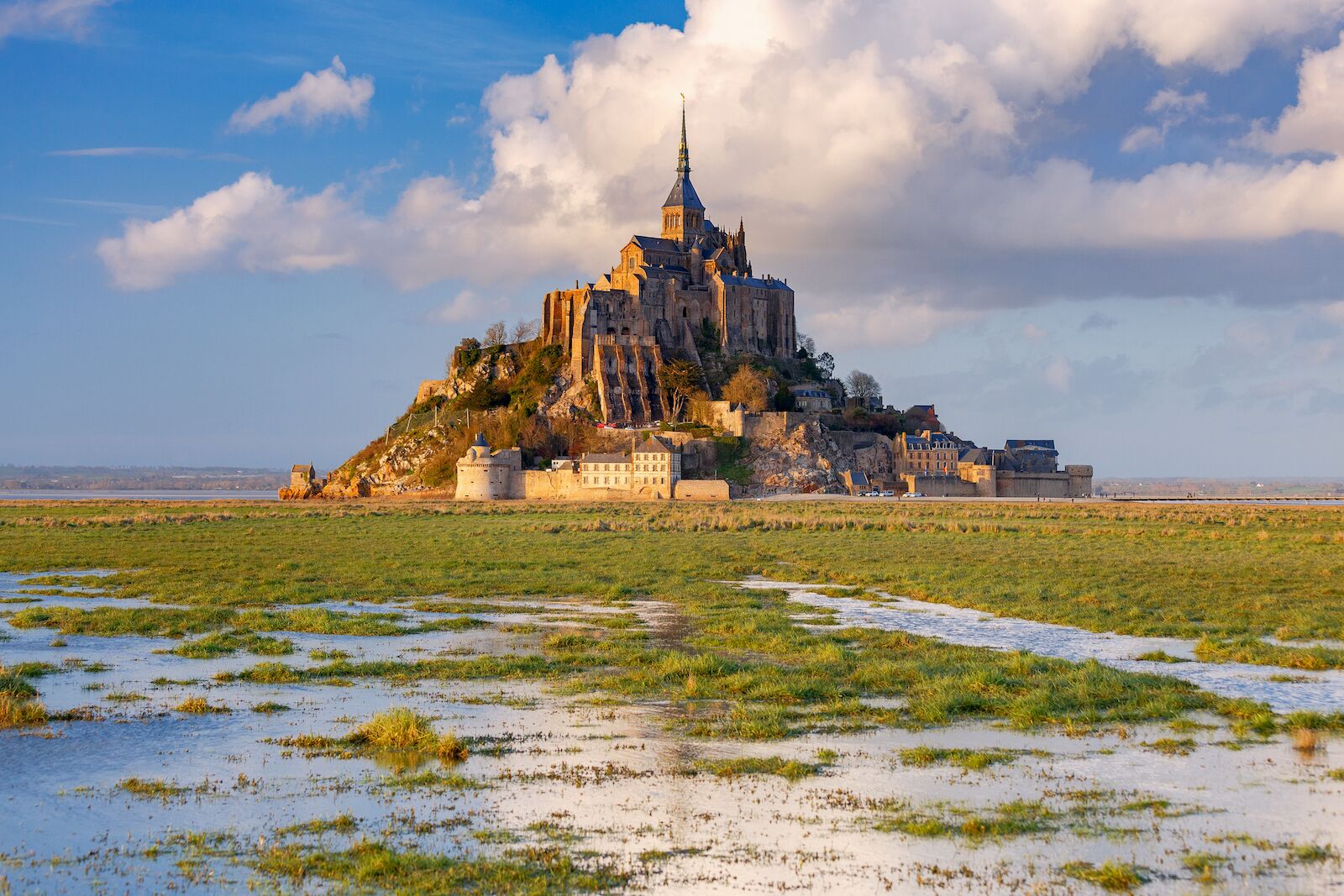
In addition to its religious and historical significance, Mont-Saint-Michel has also served as a source of inspiration for numerous works of art and literature. The island’s dramatic silhouette and ever-changing tides have been immortalized in paintings, photographs, and films, while its rich history has provided the backdrop for countless novels and poems.
Today, the island continues to be a hub of cultural activity, with a vibrant community of artisans, chefs, and performers who contribute to the unique atmosphere and experience of visiting Mont-Saint-Michel. Visitors can explore the island’s many galleries, workshops, and boutiques, where they can discover the work of local creators and immerse themselves in the island’s creative energy.
The Challenges of Preserving Mont-Saint-Michel
As one of France’s most iconic and beloved landmarks, Mont-Saint-Michel faces a unique set of challenges when it comes to preserving its natural and cultural heritage. Over the centuries, the island has had to contend with the relentless forces of nature, including the ever-changing tides, erosion, and the threat of flooding.
In recent decades, the island has also grappled with the challenges of managing the influx of millions of visitors each year. The sheer volume of tourists can put a strain on the island’s infrastructure and natural resources, and there is a constant need to balance the preservation of the island’s historic character with the demands of modern tourism.
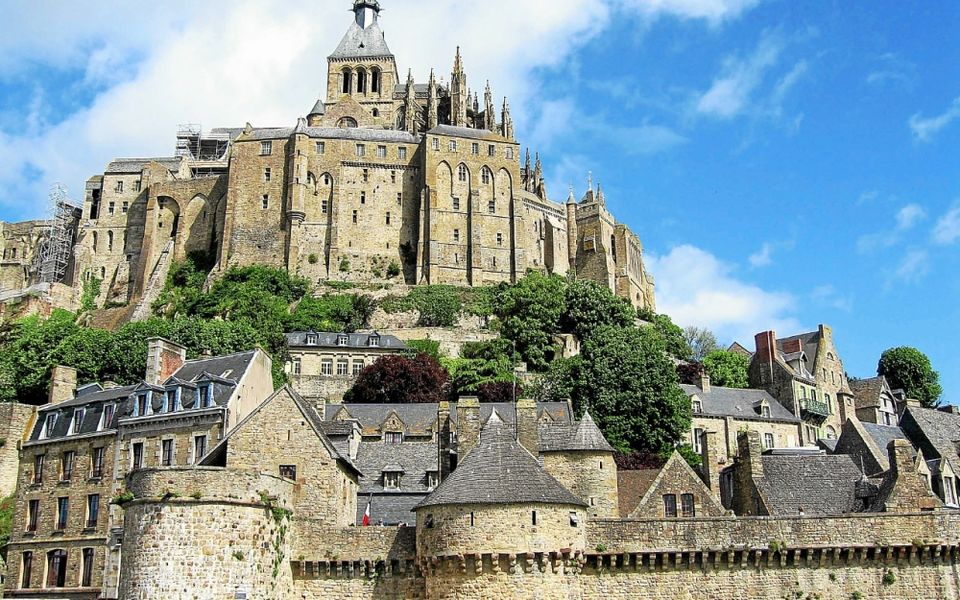
To address these challenges, the French government and local authorities have implemented a comprehensive preservation and management plan for Mont-Saint-Michel. This includes measures such as the construction of a new causeway and visitor’s center, which have helped to alleviate congestion and protect the island’s fragile ecosystem.
Additionally, the island has been designated as a UNESCO World Heritage Site, which provides it with additional protection and resources for conservation efforts. Ongoing research and monitoring of the island’s environmental and cultural assets are also crucial to ensuring that Mont-Saint-Michel remains a vibrant and sustainable destination for generations to come.
Conclusion: Experiencing the Magic of Mont-Saint-Michel
In the end, the true magic of Mont-Saint-Michel lies in its ability to transport visitors to a different time and place. Whether you’re marveling at the abbey’s soaring spires, strolling through the island’s charming medieval streets, or witnessing the dramatic ebb and flow of the tides, a visit to this remarkable tidal island is an experience that will linger long in the memory.
For those seeking a glimpse into France’s rich history, a connection with the natural world, and a sense of the extraordinary, Mont-Saint-Michel is a must-visit destination. So pack your bags, don your walking shoes, and prepare to be captivated by this jewel of the French north coast – a place that truly lives up to its reputation as one of Europe’s most beautiful and enchanting sites.
